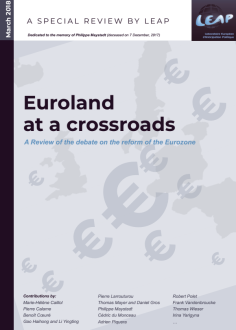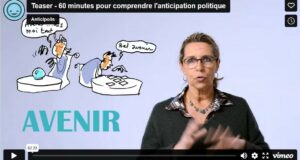In a European Union in great practical and moral difficulty, the eurozone is looking more and more like Europe’s ‘hard-core’ – that has resisted the shocks absorbed by our continent in the past 10 years better than the rest. And this is to be expected: the eurozone is composed of the countries that have chosen the fullest integration. Sharing the same currency, they are firmly embarked on the same course and have no choice but to find ways to live together. As we have seen in this Special Review, sharing the same currency entails talking about common taxation and joint investment. Automatically, this raises questions about the means of providing this financing capacity: Defence, social, environment, economic recovery, employment etc. A political Europe, therefore … and democratic as well hopefully … Are we finally getting there?
Problem: The Eurozone is not the EU … how to build a democratic Eurozone while all eyes are fixed on “Brussels” and while the only mechanisms supposed to connect citizens to the European institutions are connected to the EU (European election, European Parliament)?
In terms of European democratization, citizens have two possibilities today:
1. To reform: Betting on an EU-based European democratisation, by invading the 2019 European elections via the trans-European political movements that are generating a wide public debate on the future of Europe with the intent of sending large numbers of European representatives (in addition to national ones) into the European Parliament …
2. To create: betting on a Eurozone-based European democratization, by mobilizing ourselves on the creation from scratch by citizens and for citizens of democratic mechanisms connecting us to the decision-making system of the Eurozone, a Eurozone that is now so instrumental in providing the European architecture with the necessary resources to implement any policy.
Without denying the relevance of the first option, this article wishes to affirm the political proposal to democratise the eurozone and demonstrate its potential for modernisation: the eurozone is a terra incognita at the heart of the EU and, as such, provides the perfect opportunity for the development and construction of the Europe of tomorrow that citizens need to seize.
This Special Review provides a rarely acknowledged opportunity to make possible a ‘storming of the Bastille’ of the Eurozone!!
A parable
Over time, towns and villages define a heart that tells a lot about the society that develops around it: a market, a church, a cityhall, a school, a theatre, a cinema, a supermarket or a mall… urban planning keeps track of our successive societal choices.
It is therefore appropriate to wonder what Europe chose to place at its heart.
The European project was based on a principle of pooling the wealth over which we merrily killed one another every 20 years. This led to the joint management of the emblematic coal and steel through the ECSC. The project then grew into – and now bumps on – a (quite different) principle of free-trade area based on the free movement of goods, capital and people. Today, in crisis, this project only survives thanks to being built on the solid core of our common currency, which now places at the heart of the European edifice … a bank – the European Central Bank (ECB).
It is this European Central Bank which constitutes the centre of our European human community, a community reduced to the citizens of 19 countries, the countries of the Eurozone, indissolubly linked for better and for worse.
Indissolubly
The Greek crisis has indeed shown us how futile, if not dangerous, it is to dream of going back to the past in order to solve problems created by the mistakes of the past. No doubt Greece was not ready to enter the Eurozone; but Europe thought it could “afford” little Greece … and when the bill arrived, it no longer wanted to … or rather it was no longer technically and politically ready to sign this kind of cheque.
La crise grecque nous a en effet montré combien sont vains, voire dangereux, les rêves de retour en arrière pour résoudre les problèmes créés par les erreurs du passé. Sans doute la Grèce n’était-elle pas prête à entrer dans la zone euro ; mais l’Europe a cru qu’elle pouvait « se payer » la petite Grèce… et, quand la note est arrivée, elle n’a plus voulu… ou plutôt c’était elle qui n’était pas techniquement et politiquement prête à signer ce genre de facture.
So much so that Germany at one point believed it could cut off and exclude, at least temporarily, Greece from the Eurozone… This kind of idea usually comes from ‘demagogic’ movements. Strange that the German financial technocracy could seriously think about getting rid of the problem so easily. History has no ‘rewind’ button … and when forces emerge with such ideas, we are approaching our worst hours.
Yet it is unfettered and in all sovereignty that the 19 countries of the Eurozone have decided to abandon their currencies and tie their destinies together. If the financial crisis of the last 10 years has revealed that the project was not completed and that the next stages of construction of the Euro area will not be minor, this is no reason to fall at the first hurdle; on the contrary, imagination is required and to find the necessary resources to move forward.
Work in progress
As we see in the interview with Thomas Wieser above, the Eurozone, away from media-democratic radars, has addressed the most urgent issues, creating stabilization mechanisms that defied Euro-collapse predictions. These men and women working behind the scenes may have done well, but huge challenges still await the Eurozone:
. at the technical level, unconventional policies led by the ECB since December 2011 must be terminated;
. at the institutional level, the Euroland edifice[1] must be completed with a number of functional (like the European Monetary Fund described in this special review) and governing bodies (a decision-making system compatible with the European democratic principle);
. strategically, the question of the basis of legitimacy on which to make these moves must be addressed: a combination of national legitimacies of the 19 Eurozone member states or a trans-European legitimacy that only the citizens of the Eurozone as a whole can provide?
« Drunken Boat »
On this last point, the Greek crisis has proved that a miscellany of national interests only results in a weakening of the common edifice, and thus directly damages the interests of the nations that make up the union. The euro zone, even more than the EU, needs to anchor itself and find the strength to move forward in a European “demos” that many say does not exist. So, while waiting for this “demos” to come to life, a “financial technocracy” continues to steer the ship … with sole “objectives” to plug the leaks and avoid icebergs … but without vision of the destination, because this is a subject that concerns the politician and not the technician. But Euroland policians sure don’t exist!
On the basis of this observation, it is easier to understand why, in January 2014, the German Finance Minister, Wolfgang Schäuble, proposed the creation of a Parliament of the Eurozone[2].
It also becomes clearer why the European Commission proclaimed itself a legitimate forum for governance of the Eurozone in its 6 December proposals (presented in this Special Review).
Unfortunately, at this stage, Eurozone governments are unable to agree on creating create a Eurozone parliament.
As to the European Commission, it is and shall remain the institution of the EU, a Union that fails in producing the convergence supposed to be its sole « raison d’être ». Its DNA makes it the authority of the management of Brexit more than that of the political anchorage of the Eurozone.
Unfortunately as well, the European “demos” is struggling to exist. After 10 years of crisis, it has been trained by its national media to associate the word “European” with all the evils affecting it: euro crisis, European migration crisis, European social dumping, tax evasion in Europe, etc … This it ended up being convinced that since the problems were European, getting out of Europe would help getting rid of problems …
This kind of mindset, which results from a media system that has not adapted to the European dimension of today’s challenges, annuls, in part, the potential for the emergence of a European « demos » that has been created by the 30 years of European citizenship material produced by the Erasmus program.
Anticipation
The prospects are therefore gloomy, and the anticipation that logically results from the previous observations is as follows: the hard-core of Europe will close and harden around a euro in the form of a “holy of holies”, into the hands of a caste of priests speaking a liturgical language inaccessible to ordinary mortals (or “Wall Street English”) in charge of perpetuating the system against all odds, surrounded by a “Praetorian Guard” composed of European institutions attacked on all sides by a hostile external world, reactionary national forces, citizens increasingly critical of a system they understand less and less, and in which they hold a losing hand.
But this article is not intended to prompt despair.
The ruthless description above mostly aims at showing how important it is to find a solution to the « crisis of the future » that Europeans are now facing. If we agree on this urgency, let’s look together for a movement towards solutions.
People’s power
Starting by focussing on positive movements in Europe today. To begin with, those European citizen mobilisations in favour of Europe, born in the aftermath of the Brexit (Stand up for Europe, Pulse of Europe, March for Europe, Cambiamo Rotta al’Europa) but also some truely political movements such as Diem25 (see paper on the political offer) which turn Eurocriticism into a force for action and transformation. Expressions of European citizenship are therefore materializing in the run up to the 2019 European election. A trans-European « demos » is emerging … enough to start tackling the political challenges of the 21st century.
Inevitably, this “demos” is emerging from a debate on the redefinition of and the political orientations to be given to the European institutional apparel. This debate on the future of Europe adresses a large number of topics : environment, redistribution of wealth, economic recovery, financing of infrastructures, jobs, common defence, external relations, management of migration flows, education … all the elements of a common vision of society.
But the hopes that these European political forces are likely to generate in the 2019 European elections campaign run the risk of coming up against the structural disconnection that exists between the EU framework (27-28) in which they evolved and the Euroland framework (19) where the tools for financing any ambitious policy lie. It is therefore essential that these movements take hold of the issue of Eurozone governance, and that they do so by bringing to it what lacks so much, namely democratic expression.
A Euroland Parliament
To the question does « the European Parliament » have an influence on the Eurozone? », if the answer is « No! », then its members should conclude that their projects don’t have a chance to see the light of day because the « treasury » is beyond reach.
And indeed the answer is « No ! » : during the euro crisis, the Bundestag had more influence than the European Parliament on the policies the Eurogroup was trying to implement.
From there, two solutions appear :
. to consider as early as today providing the European Parliament with a purely Eurolandic body, ie a Eurozone committee composed of representatives of the Eurozone only ;
. to consider as early as today creating, based on the potential for citizen mobilisation, a new entity of democratic representation.
The second solution may seem the craziest. But that’s because it carries a vision for the future, innovation and regeneration. It is the most likely to bring Europe into the twenty-first century by making it possible to invent a parliamentary system 4.0 (conceived on the basis of the possibilities brought by new technologies), an essential contribution to the debate on our « democracy in crisis » at the global level, and make the European beacon shine again.
A concrete proposal
The project we’ like to submit to the emerging European “demos” is to organize in parallel the 2019 European elections:
. an online election
. of trur European dimension
. limited to Eurozone citizens only
. targetting first the younger generations – which are ready for this kinf of experiment
. with an turnout target around 30 million citizens (1/10th of the Euroland population)
. aimed at establishing a first « e-Assembly of Euroland Citizens »
. at the end of a 12-month process along which participants will be invited to:
1/ structure a differentiated political offer in order to run for the election, and
2/ define together the operating rules and criteria of their e-Assembly
. with the ultimate goal to connect the financial tools of European policies to the Europeans’ societal choices, via the Euroland.
Of course we don’t pretend that this first e-Assembly will be the final model of representation of Euroopean citizens. But we are certain that if 30 million Eurolanders participate in such a vote, the momentum thus trigerred would be irresisitible and likely to unblock:
1/ The key objective of the democratic articulation of the EU’s hard-core, ie the Eurozone,
2/ the key objective of the renewal of European political classe, and also
3/ the key objective of the invention of democratic mechanisms based on new technologies.
Giving the Europeans a future again
Other ideas probably have the capacity to simultaneously fulfill these three objectives, the importance of which we hope to have convinced you. What matters today, is to take our continental destiny out of the rut, to give European citizens a future, to understand that the EU is undergoing a very serious existential crisis that it could never recover from, to admit that the Eurozone is the strongest part of the edifice, and to deduct from all this the right areas to target citizen energy. Indeed, the world’s technically most efficient democratic mechanism can only fail if it doesn’t connect the citizens to the real power places.
Let’s hope therefore that the European citizens will succeed in seeing all that and sending their energy in the right direction. Should they fail, major political crises are ahead of us from 2019 onward. Should they succeed, the whole of the European project will be regenerated, simultaneously rescuing the visionary model of regional integration invented by Europe’s founding fathers in the aftermath of yet another suicide of our continent.
The survival of this model would also allow to hope for a world made of the big national (China, India, etc…) and supranational entities (EU, ASEAN, MERCOSUR,…) participating on a equal foot to global governance… a global governance which would in turn be able to start inventing its own political anchoring based on the grand innovation of Euroland’s citizens: supranational democracy made possible by new technologies…
(a Selected piece of our special review “Euroland at a crossroads” – electronic version available for 5 euro on Anticipolis)
Marie-Hélène Caillol, President of LEAP2020 (Laboratoire européen d’anticipation politique / European laboratory of Political Anticipation), President of AAFB (Association des Amis de Franck Biancheri)
Notes :
[1] Since 1997, the movement which LEAP comes from and which is linked to the character of Franck Biancheri, uses the term Euroland to evoke the sovereign entity that the adoption of the single currency has in fact created and which, more that a “zone” must be understood as a country.
[2] « Schauble sees need for separate eurozone parliament », EUObserver, 29/01/2014


 LEAP2040 Toutes les informations et archives Europe2040
LEAP2040 Toutes les informations et archives Europe2040



